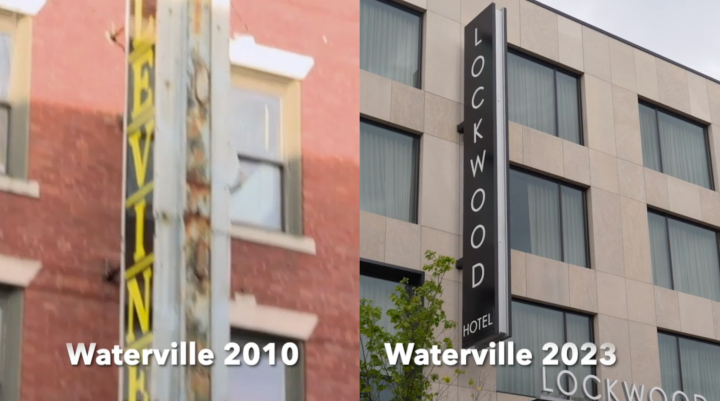
Revisiting a revitalized Waterville, Maine

Coming out of the great financial crisis, I did a documentary exploring better ideas for the economy. For a taste of problems looking for solutions, we opened the film — “Fixing the Future” — in a New England mill town littered with closed factories.
An early shot shows me peering into a clothing store that had sat empty for 15 years. The Hathaway shirt and Scott Paper jobs were gone, and big boxes had sucked retail out to near the I-95 interchanges. I knew this because this was my hometown, Waterville, on the Kennebec River in Maine. It was 2010.
A dozen years later, a new $26 million hotel, the Lockwood, stands on the same block. The bar off the lobby looks like it was barged up the river intact from Manhattan. But private hotel chains weren’t spending on this stretch of Main Street that time forgot. Who did?
For one, Colby College, a liberal arts school that shares the same zip code.
“One of the beauties of being a college that’s been around for 200 years and we expect we’ll be around for 200 years more is that we can be the ultimate patient investor. We can wait,” said David A. Greene, president of Colby.
“We can invest in this — not for profit — but we can do this in a way that helps to stimulate something better for the community,” said Greene. “And having a great city is good for Colby, it’s good for Waterville.”
Here’s where I disclose I’ve long known Colby. My late dad was a literature professor there for decades.
Greene told me that in just four blocks of Main Street, there’s been “a couple hundred million dollars” in reinvestment. Colby ponied up half. The other half comes from the Harold Alfond Foundation, which has roots in Maine. Individual donors and the Feds also chipped in.
Across from the hotel, long-gone Waterville Hardware is now artist studios and maker-space. A few paces north, planners see this extravaganza as a cultural living room.
“It’s a place where it is completely okay to go for a cup of coffee, completely okay to go in and, you know, make ceramics are completely okay to go and see a movie,” said Jacqueline Terrassa, director of the famed Colby College Museum of Art up on campus.
She has opened an outpost here, part of a brand new art center on Main Street. The museum is adjacent to an arthouse movie theater with three screens all connected by sky walk to the historic Waterville Opera House.
Robin Samalus-Getchell runs the florist shop in the old Waterville Savings Bank building. Moving here, her sales went up 93%.
“Any sort of sunny, beautiful summer day there are tons of people walking on Main Street, having lunch, stepping in getting a coffee next door,” she said. “You could look out and feel like maybe you’re in the city for a couple of minutes.”
The college bought this building and is Samalus-Getchell’s landlord. Nonprofits are tax exempt, but Colby pledged to keep what it owns downtown on the tax rolls, increasing tax revenue for the city seven-fold.
“That is an annuity for the city,” said president Greene. “That makes such a big difference for the public schools that are here, for the social service organizations that are here.”
There’s demand for these services — the typical household earns just $41,000 a year. And revitalization has winners and losers. If property values rise, it’s great if you’re selling or borrowing against the property, but maybe not if you’re staying put and paying more in taxes.
Plus, housing affordability can drive rents higher, but can also persuade developers to build more housing. The college’s role here plays into town-versus-gown friction. Colby has work to ease this in part by building one of its dorms downtown, where students have to give back to the community through volunteering.
Still, some residents now call downtown not Waterville, but Colby-ville.
Ken Vlodek is the owner of a vibrant sewing store, Yard Goods. He’s fine with the hotel and the arts, but not with the college being such a power player, even with city officials and philanthropies so involved.
“It was a great investment,” he said. “But when somebody says Colby College invested over $100 million in downtown, I look at it as they didn’t invest a cent in downtown. What they invested in was a extension of the Colby College campus, which is what we have.”
Vlodek’s overriding issue is what the Main Street dorm has done to parking. He feels frustrated in his campaign to get local authorities to beef up enforcement of student cars.
Nearer the river, a shuttered tavern once famous for characters inside and brawls outside is about to get the wrecking ball. A private developer likes the town’s new energy and will build stores and apartments.
President Greene sees a tipping point.
“In the end, you can’t have a project like this that is upheld entirely by a place like Colby or philanthropic money or anything else,” he said. “You have to have the market at work.”
There’s a lot happening in the world. Through it all, Marketplace is here for you.
You rely on Marketplace to break down the world’s events and tell you how it affects you in a fact-based, approachable way. We rely on your financial support to keep making that possible.
Your donation today powers the independent journalism that you rely on. For just $5/month, you can help sustain Marketplace so we can keep reporting on the things that matter to you.

















